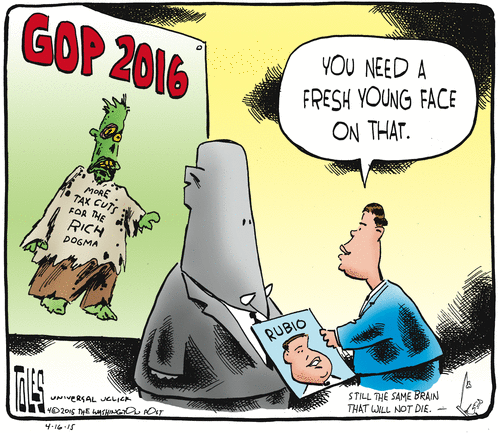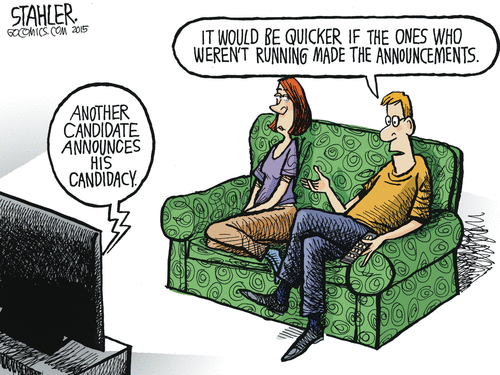Herbert
Spencer was a popular author during the nineteenth century who
supported strict limits on the government and even opposed many forms of
charity towards the poor. Nature, Spencer argued, "secures the growth"
of the human race by "weeding out those of lowest development," and he
also believed that neither government nor private charity should
interfere with this process of natural selection. Though Spencer was not
a eugenicist - he actually argued that the poor should be treated much
more harshly than nineteenth and twentieth century eugenicists did - he
was both a social acquaintance of Sir Francis Galton, the father of the
eugenics movement, and a significant influence on Galton's thinking.
Spencer also shaped many of the policies developed by some of the most
powerful judges and lawmakers of his era.
Reading Spencer's many
works today is an uncomfortable experience - the man devotes hundreds
of pages to establishing a philosophical justification for a kind of
neglect that most Americans would now view as a moral atrocity. Yet
Spencer is also one of the foundational thinkers in the development of
the economically libertarian philosophy that drives politicians such as
Sen. Rand Paul (R-KY).
On Monday, ThinkProgress published a
piece entitled "Rand Paul's Favorite Philosophers Think Poor People Are
'Parasites.'" The thrust of the piece is that, though Paul now claims
that his policies would lift up poor people and minorities, the economic
libertarianism that drives Paul is so inherently anti-poor and
anti-civil rights that Paul's efforts to offer himself up as the
champion of the downtrodden are misguided at best and deeply cynical at
worst. Over the course of the piece, we trace the intellectual roots of
economic libertarianism through Paul's father, former Rep. Ron Paul
(R-TX), as well as through thinkers such as Murray Rothbard, Ayn Rand
and Spencer.
This is, to say the least, a rogue's gallery of
philosophical influencers. Rothbard, a self-described
"anarcho-capitalist" economist, called for "abolishing the welfare
system" and accused "the entire 'civil rights' structure" of
"trampl[ing] on the property rights of every American." Ayn Rand labeled
men and women who seek government assistance as "irrational,"
"parasites," "dishonest," "thieving loafers," "compromising knaves,"
"sniveling neurotics," and as "both a beggar and a sucker." Spencer's
"own philosophy," we conclude "can safely be described as genocidal
libertarianism."
Not long after we published this piece, two of
the libertarian movement's flagship institutions leaped to Spencer's
defense. Over at Reason, Damon Root does not contest our description of
Spencer as one of the foundational thinkers in the development of Rand
Paul's economic libertarianism. He does, however, contest our
description of Spencer as a genocidal libertarian. Though we quote
Spencer's 1851 book Social Statics, which opposes "[a]cts of parliament
to save silly people" and argues that if a man or woman is "not
sufficiently complete to live, they die, and it is best they should
die," Root claims that Spencer "never advocated anything remotely like
letting the poor die in the streets." Root concludes his piece with an
oversimplified history of eugenics in the United States, claiming that
Progressives, and not nineteenth century proto-libetarians like Spencer,
are the real eugenicists. (Though Root throws around the capital "P"
term "Progressive" throughout his piece, it is worth noting that this
term is not synonymous with the lower-case "p" term "progressive," which
is often used to mean "liberal.")
Shortly before Reason
published Root's piece, the Cato Institute - arguably the nation's most
influential and well-funded libertarian institution - published a
similar piece purporting to rebut our description of Spencer.
The
fact that Cato and Reason both reacted so swiftly is a testament to the
central place Spencer holds in the development of libertarian thought.
According to Rothbard, who the elder Paul describes as the "founder of
the modern libertarian movement," Spencer's Social Statics is the
"greatest single work of libertarian political philosophy ever written."
Yet this foundational libertarian text does not say what Root and Cato
claim that it said. Indeed, if Social Statics is, indeed, the "greatest
single work of libertarian political philosophy ever written" then that
is the most damning indictment of libertarianism imaginable.
The Real Herbert Spencer
Root's claim that Spencer did not
support allowing the least fortunate to die from neglect is simply
wrong. Social Statics claims that "stupidity," "vice," and "idleness"
are "nature's failures," that people who possess these traits "are
recalled by her laws when found to be such." These human "failures," are
the people Spencer casts aside with the dismissive conclusion "they
die, and it is best they should die."
To rebut this point, Root
quotes a different passage of Social Statics, where Spencer writes that
"in so far as" nature's cruelty "is mitigated by the spontaneous
sympathy of men for each other, it is proper that it should be
mitigated." To Root, this is proof that Spencer believed that private
charity should reduce the suffering caused by a laissez-faire society.
Yet,
while it is true that Spencer did believe that charity was appropriate
under limited circumstances, Root would have done well to read the
entire paragraph where Spencer talks about "the spontaneous sympathy of
men for each other." In that paragraph, Spencer also warns that charity
sometimes "defeats its own end." As Spencer writes,
Instead of diminishing suffering, it eventually increases it. It
favours the multiplication of those worst fitted for existence, and, by
consequence, hinders the multiplication of those best fitted for
existence-leaving, as it does, less room for them. It tends to fill the
world with those to whom life will bring most pain, and tends to keep
out of it those to whom life will bring most pleasure. It inflicts
positive misery, and prevents positive happiness.
Charity, in other words, risks extending the life of individuals who are unworthy of living.
Root,
however, persists in his effort to rehabilitate Spencer. "Spencer
devoted 10 chapters in his two-volume Principles of Ethics to spelling
out the importance of "Positive Beneficience," Root writes, "otherwise
known as charity towards the impoverished and the unfortunate."
Ten
chapters is a whole lot of chapters! Only one of these chapters,
however, focuses specifically on the issue of "Relief for the Poor." And
that chapter spends far more time discussing cases where charity is not
appropriate than it does laying out the few cases where Spencer
believed that private donors should improve conditions for the poor.
Needless to say, Spencer called for a near-blanket prohibition on
"relief of the poor from public funds raised by rates," but he also
objected to charity administered by "privately established and voluntary
organizations." When a donor gives to such an organization, Spencer
reasoned, the "beneficiary is not brought in direct relation with the
benefactor" and this increases the likelihood that the money will
ultimately be spent on "idlers, spendthrifts, and drunkards" or someone
else that Spencer viewed as "worthless."
Indeed, the primary
thrust of Spencer's chapter on "Relief for the Poor" is that charity
must be carefully tailored to "increas[e] the aid given to the worthy
and restrict[] that given to the unworthy." Those that Spencer deems
"unworthy" of charity must be cleansed through suffering:
Having, by unwise institutions, brought into existence large numbers
who are unadapted to the requirements of social life, and are
consequently sources of misery to themselves and others, we cannot
repress and gradually diminish this body of relatively worthless people
without inflicting much pain. Evil has been done and the penalty must be
paid. Cure can come only through affliction. The artificial assuaging
of distress by state appliances, is a kind of social opium eating,
yielding temporary mitigation at the eventual cost of intenser misery.
Increase of the anodyne dose inevitably leads by and by to increase of
the evil; and the only rational course is that of bearing the misery
which must be entailed for a time by desistance. The transition from
state beneficence to a healthy condition of self-help and private
beneficence, must be like the transition from an opium-eating life to a
normal life-painful but remedial.
Spencer's views on charity, in other words, are entirely consistent
with the vision he laid out in Social Statics calling for genocide by
neglect.
The Birth of Eugenics
Having misstated Spencer's views,
Root then changes the subject to eugenics. Eugenics is a morally
bankrupt philosophy which claims that undesirable traits ranging from
"feeblemindedness," to criminality to sexual promiscuity can essentially
be bred out of the human race by preventing individuals who posses
these traits from reproducing. As Root notes, many early twentieth
century Progressives believed in eugenics, though this fact has far less
relevance to modern politics than Root implies because, as we note
above, the capital "P" term "Progressive" is not synonymous with modern
day liberalism. Nor, as we explain below, was support for eugenics
limited to Progressives.
The father of eugenics, like modern day
libertarians, was influenced by Spencer. Sir Francis Galton was a
contemporary of Spencer's who also divided humanity into the worthy and
the unworthy. A few years after Spencer's death, Galton was invited to
deliver the Herbert Spencer Lecture at the University of Oxford, where
Galton acknowledged his "personal debt" to Spencer - the two men would
often converse over games of billiards at London's Athenaeum Club. Yet
Galton's vision for humanity differed from Spencer's in several
important ways. As I explain in my book, Injustices: The Supreme Court's
History of Comforting the Comfortable and Afflicting the Afflicted,
Galton shared Spencer's desire to build a stronger, more worthy race of
humans, but he believed that this task should be accomplished
differently than Spencer did:
While Spencer wrote that we should simply ignore the least fortunate
and allow nature to kill them off, Galton preferred a more active
approach. "What Nature does blindly, slowly and ruthlessly," according
to Galton, "man may do providently, quickly and kindly."
In
one sense, Galton offered a more moderate alternative to Spencer's
genocidal libertarianism, as he did not argue that the least fortunate
should simply be allowed to die. "I do not," Galton explained, "propose
to neglect the sick, the feeble or the unfortunate." To the contrary, he
promised to do everything he could "for their comfort and happiness."
This charity, however, came at a steep price: "I would exact an
equivalent for the charitable assistance they receive, namely, that by
means of isolation, or some other drastic yet adequate measure, a stop
should be put to the production of families of children likely to
include degenerates."




















